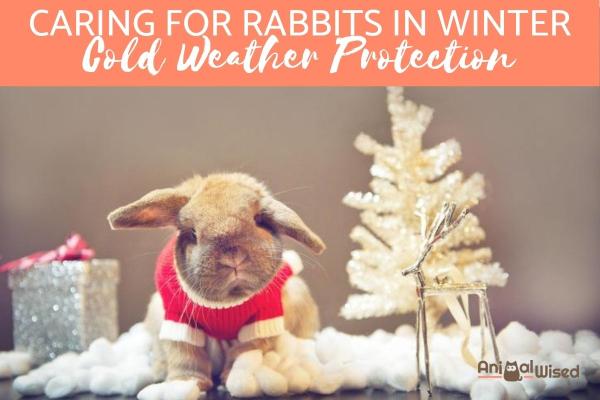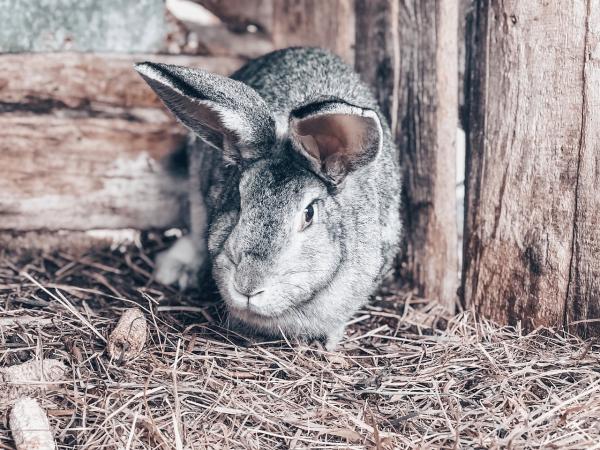Caring for Rabbits in Winter



See files for Rabbits
The type of care you provide a rabbit will depend on many factors relating to the individual bunny. Age and health status are two of the most important. However, there are also important environmental factors which affect rabbit care, one of the most important being the changing of the seasons. Although rabbits generally better tolerate low temperatures rather than warm, the onset of winter can bring cold weather which is dangerous for rabbits. Such low temperatures can increase the risk of developing some of the diseases most common in rabbits, including the common cold and respiratory problems. In acute cases, they can develop hypothermia.
To prevent any such problems for rabbits in cold weather, AnimalWised provides our guide on caring for rabbits in winter. We show you how to prepare their hutch to keep them warm and reveal how you can tell if your rabbit is cold.
How cold is too cold for rabbits?
As we have mentioned, rabbits are better adapted to temperate and cold climates than very hot regions. In the latter areas, rabbits can easily suffer from heat stroke, something they protect themselves from in nature by burrowing underground. Different breeds of rabbit have morphological differences such as having more or less fur. This can also affect how well they tolerate cold, as can their place of origin.
In theory, rabbits in the wild can endure temperatures down to around -10 ºC/14 ºF. This is as long as they have shelter to protect them from the elements. While it is not their ideal temperature, anything below -10 ºC/14 ºF is considered too cold.
However, the lagomorph's lifestyle is also a factor when it comes to low temperatures. Animals which have always lived indoors at a stable temperature might be seriously harmed if exposed to such cold environments. No domestic rabbit should be exposed to extreme temperatures of any kind.
How cold is too cold for a dwarf rabbit?
Since body size can affect their tolerance for cold temperatures, caring for a dwarf rabbit in winter can be tricky. This is because they are even more vulnerable to the cold and climatic changes. Ideally, dwarf rabbits should live in temperatures ranging between 18º C to 20 ºC (64.4 ºF to 68 ºF). At this temperature range, they can best avoid respiratory problems and other diseases associated with cold weather.
Do rabbits hibernate in winter?
There is currently no known species of rabbit which hibernates in winter. As with most non-hibernating mammals, the rabbit will eat more during the wold weather months. We will need to pay attention to their diet at this time and will likely need to provide a higher calorific diet until temperatures rise again.
Symptoms of cold in rabbits
Now you know that lagomorphs (rabbits are from the order Lagomorpha) adapt best to temperate regions, you may be wondering how to tell if a rabbit is cold. The normal body temperature of rabbits should be between 38.5 ºC/101.3 ºF and 40 ºC/104 ºF. The optimum temperature for their environment should be around 18 ºC/64.4 ºF. When the temperature in their environment drops rapidly or abruptly, we may see the following signs of cold in rabbits:
- Tremors
- Stiffness in muslces
- Cold snout and ears
- Cramps
- Dry Skin
- Slower breathing
- Difficulty breathing
- Slow movements
- Clumsiness
- Inactivity
If the bunny's body temperature is below 36 ºC, characteristic symptoms of hypothermia in rabbits may occur. These indicate the rabbit has a severe decline in their health. Some of the symptoms of hypothermia in rabbits are:
- Loss of appetite
- Reduced heart rate
- Dilated pupils
- Staring into distance
- Depression
- Disorientation
- Fainting
- Collapse
- Sudden death
These symptoms are of rabbits exposed to the cold, but there are some which are shared by other diseases in rabbits. For more general information, take a look at our article on symptoms of a sick rabbit.

What to do if my rabbit is cold
Since we need to be careful if our rabbit shows signs of being too cold, we need to act quickly. This will help to prevent the bunny's temperature from dropping too low and hypothermia occurring. Many people wonder what we should do in terms of first aid for rabbits affected by low temperatures.
The first thing we should do is wrap them in a dry blanket or towel to maintain the rabbit's body heat. You can also hold them in your arms wrapped in the blanket to transmit some heat of your own. This will help to regulate their body temperature and combat the symptoms of cold. You should not try and warm them up too quickly as this can cause them to go into shock.
If your rabbit has become wet due to rain or snow, then you will need to dry them first. Dray them with a clean towel until their fur is dry to the touch. Then you can wrap them in a dry towel or blanket to maintain their heat. When combined with the low temperatures, humidity can facilitate the development of hypothermia symptoms. Do not use electric heating blankets as the combination of heat and moisture can be dangerous.
You should keep the rabbit inside at a stable ambient temperature of no less than 18 ºC/64.4 ºF. As your rabbit recovers, we recommend you check their body for frostbite or ice burns. if you do identify any abnormality, then you should not hesitate to take them for a veterinary examination.
If your rabbit does start to show signs of hypothermia, then they might be in trouble. Use the above tips as first aid and then take the rabbit to an emergency veterinarian specialized in rabbit care. They will be able to administer better quality medical intervention.

Caring for your rabbit in winter
To prevent your rabbit from being cold, you will need to provide some specific care during the winter months. This is in addition to the basic care rabbits need to lead a healthy, active and happy life. For specific tips on caring for rabbits in winter, you should consider the following:
- Condition the home: if the region where you live experiences cold weather, heating systems will help you provide optimal temperatures for your rabbit in winter. However, remember that artificial heating tends to dry out the air. For this reason, we we recommend spraying water in the rabbit's room two to three times a week. Remember not to wet the rabbit, but to spray their surroundings.
- Prepare their hutch or cage: a rabbit's hutch is their resting place and somewhere they need to feel secure. It will need to be prepared in such a way as to provide the rabbit with comfort and shelter during the winter months. If the hutch is kept outside the home, it is essential we protect it from the elements. In addition to leaving a blanket in the hutch, we should cover it at night to protect against chill winds. If the hutch is kept inside, keep it away from drafts in a location with good lighting.
- Food: concerning the fact mentioned above, rabbits tend to increase their food intake during the winter. Their body uses more energy to keep their metabolism stable and fight the cold. For this reason, the rabbit will need a diet which provides a little more energy in their food. Check out our AnimalWised article on how much food a rabbit should eat to know more.
- Physical and mental stimulation: rabbits are very active and intelligent animals, who enjoy exercising even during winter. Ideally, your rabbit should have room to run, jump, and explore their surroundings freely, such as a garden, patio or deck. Enriching their hutch will help stimulate them physically and develop their cognitive skills. Rabbits can also be taught a variety of tricks and basic commands.
- Preventive medicine: your rabbit will need to be vaccinated, so take your rabbit to a specialist vet ever 6 months or so. An excellent idea is to take them just before the onset of winter so they can be given the necessary preventive care to protect them through these cold months.
If you want to know more about caring for a rabbit all year round, not just in the winter months, check out our guide below on caring for rabbits:

This article is purely informative. AnimalWised does not have the authority to prescribe any veterinary treatment or create a diagnosis. We invite you to take your pet to the veterinarian if they are suffering from any condition or pain.
If you want to read similar articles to Caring for Rabbits in Winter, we recommend you visit our Prevention category.







